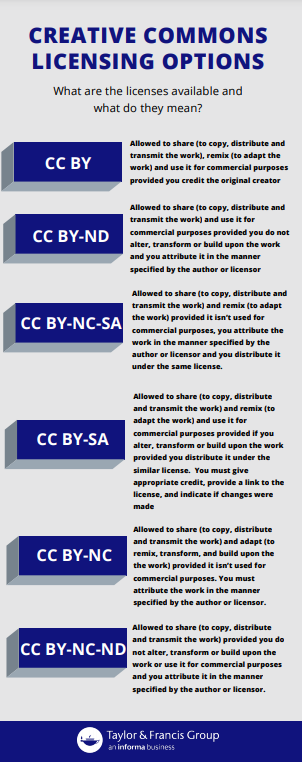Open Access Licensing
It is important for librarians to know how copyright affects the library. Librarians provide materials and need to know the user’s rights and the creator’s rights. Librarians are leaders who maintain a balance between copyright holders and their users. Librarians advocate users’ rights but must keep in mind the rights of the creator. Librarians must be knowledgeable and understand copyright and licensing to educate others. If a user has a question about copyright, they most likely will seek answers from librarians. Librarians play a key role as teachers for all aspects of both information and digital literacy education for staff and students of their institution. An understanding of how to use information ethically, including knowledge of plagiarism and copyright issues, is important.
With the rise of Open Access publishing, it is necessary to have a closer working relationship between librarians, researchers, and academics. This is relevant in relation to copyright. Traditional models for scholarly publishing have required that academics transfer copyright in books to publishers. Libraries’ involvement in this process in the past has largely been to pay for the content once publishers have arranged for peer-review, type setting and distribution. Open Access provides access to research free of charge and free of the usage restrictions that copyright would normally present. Librarians should make users aware of the common misconception- Open Access does not mean anyone can do anything with the content; the rights of copyright must still be understood and upheld.
What is Copyright?
- Copyright is a law that gives the owner of a work the right to say how other people can use it.
- Copyright licenses detail the rights for publication, distribution, and use of research.
Why is Copyright and licensing important to Open Access
- Open Access licenses are used to facilitate access and use of copyright works
- The license gives permission for others to use a work while preserving the creator’s intellectual property rights. Uses may include the right to reproduce, copy, adapt and communicate the work. Authors can choose the license that reflects what use they allow others to make of their work. The license states what uses are permitted and what conditions others must follow to legally make use of the content. Although there are other open/public licenses available, Creative Commons (CC) are the licenses that are accepted internationally.
What type of work can have a Open Access license?
- An Open Access license can be placed on a book, chapter, journal article, etc.
Why do you need to know about copyright?
- Open Access isn’t just about others being able to read research without barriers. Open Access also gives researchers greater opportunity to build upon the work of others. Most Open Access books have a Creative Commons license which explains how others can use the work. In some cases, it can give complete freedom to reuse and repurpose the published work. Regardless, it’s always necessary to acknowledge the original author.
Which license does Taylor & Francis Books Open Access use?
- Taylor & Francis Books Open Access titles are published under a Creative Commons license as standard. Our preferred license is Attribution–NonCommercial–NoDerivs (CC BY-NC-ND) license. Under this license, others may download the author’s work and share it as long as they credit the author, but they can’t change it in any way or use it commercially. The license also allows for text- and data-mining of your works. The full legal code is available here.
- We are flexible to apply a creative commons license that fits your university open access policy if your institution has funded the work. We also are flexible and try and meet any funder requirements around the creative commons license applied that researchers may need to adhere to.
Why CC BY-NC-ND?
- It is our view that this license provides the best combination of dissemination and protection, particularly for our authors in humanities and social sciences.
- It was our authors’ stated preference in the Open Access Survey: Exploring the views of Taylor & Francis and Routledge authors which corroborated the OAPEN-UK HSS Researcher Survey Results by JISC Collections.
- We believe that we are offering the licensing option that best respects our authors’ preferences and practical considerations but we are prepared to discuss other licensing options based on funder’s policies.
Taylor & Francis offers a range of Creative Commons licensing options, so you can find the right fit for your researchers.
Learn about the different Creative Commons Licensing options
References
https://creativecommons,org/licenses/
https://libguides.ala.org/copyright
https://www.copyrightuser.org/educate/intermediaries/libraries/
Fill out the form below to get in touch with the Open Access team.
